Responsible Supply Chain
Sustainable Supply Chain Management Hierarchy
Sustainable supply chain management is important to Compal. The Board of Directors is the top responsible unit and oversees the Sustainability Committee. The Committee is convened at least once every year. Its responsibilities include providing leadership on sustainability matters, external communication of policies and positions, internal definition of targets and direction, consolidation of resources, approval of action plans, performance reviews, and reporting to the Board of Directors to enhance sustainability practices.
Industry Supply Chain Overview
Compal's R&D products span multiple fields and supply chain involves hundreds of suppliers of panels, touch screens, camera modules, fingerprint recognition modules, batteries, chargers, charging cables, electronic components, electromechanical parts (printed circuit boards, flexible circuit boards, acoustic components, etc.), and structural parts. We have established close partnerships with these hundreds of suppliers to ensure product quality and performance. Through this close collaboration, we integrate diverse expertise and technology to create excellent products that meet customer demands.

■ Distribution of Supplier Production Regions
Compal is promoting local procurement to improve production and supply efficiency for raw materials, support the local economy and reduce carbon emissions from the transportation process. Local suppliers are being mentored to strengthen the local supply chain, improve in-house manufacturing, and reduce dependence on overseas procurement. The majority of suppliers are located in Compal’s key production region such as Taipei Headquarters, production bases in Sichuan and along the coast in Eastern China, and northern Vietnam. In 2024, local procurement by supplier count for each plant was Taiwan plants at 74%, China plants at 64%, and Vietnam plants at 17%. The total local procurement ratio for all Compal plants was 52%.
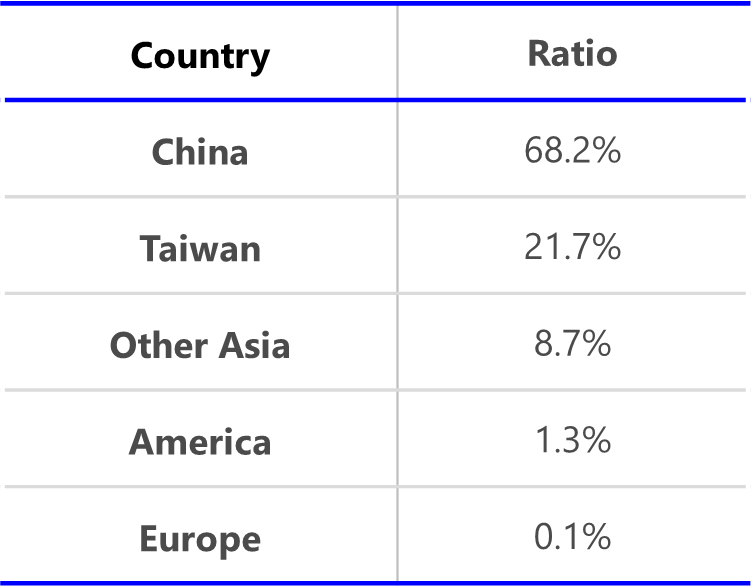
■ Supplier Classification
Compal suppliers are distributed across the world and involve a complex range of materials. Suppliers are classified by transaction patterns, procurement value, and various risk assessment standards for the effective management of ESG issues. Sustainable supply chain issues are managed according to the following supplier definitions, Tier 1 Significant suppliers account for 68% of total procurement value.
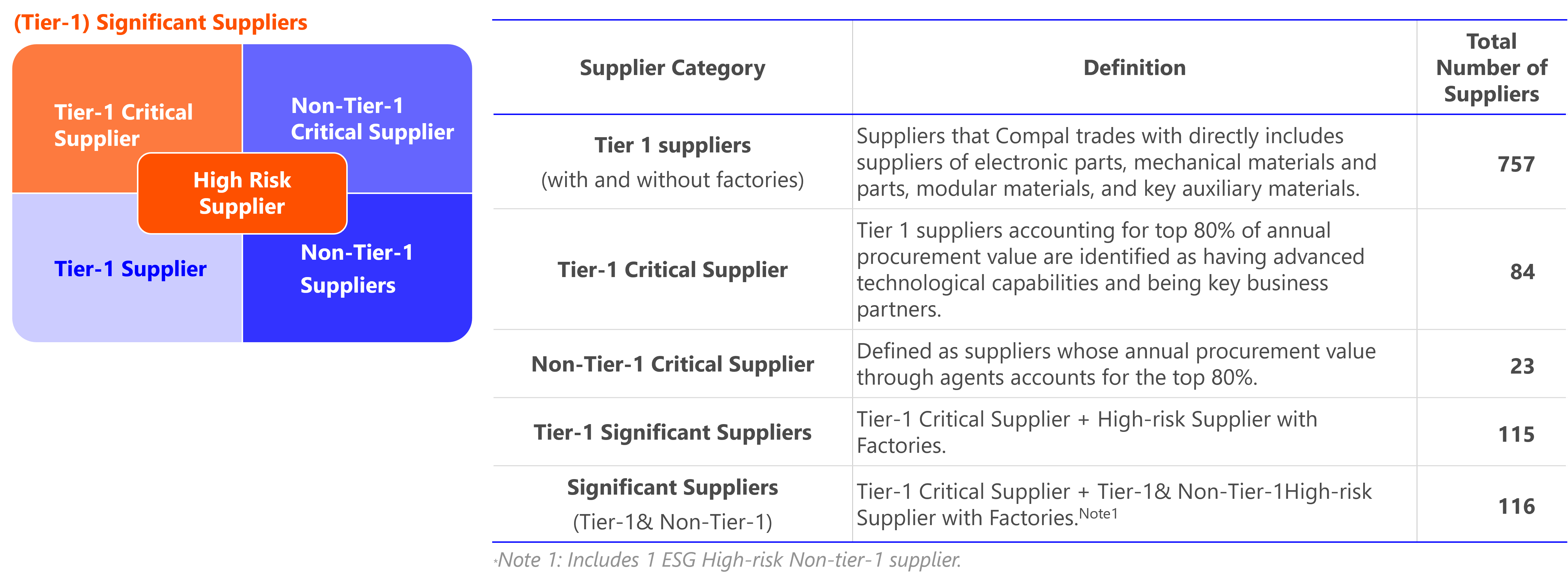
Supplier Chain Management Mechanism
As a global leader in professional contract manufacturing and RBA member, Compal views sustainable supply chain management as a key to corporate development. We are committed to ensuring that all products and services meet the highest ethical, environmental, and human rights standards. In our procurement process, we require suppliers to sign Compal's procurement contract and adhere to international quality and environmental regulations. ESG performance is also incorporated into supplier selection, and we are progressively adopting ISO international standards to enhance overall supply chain performance.
Furthermore, to continuously strengthen our sustainable supply chain capabilities, we conduct internal training for Compal's procurement colleagues on an irregular basis. We invite external consultants to share the latest trends, enhance our procurement colleagues' ability to communicate on sustainability issues and ESG performance management with suppliers, while encouraging suppliers to jointly promote ESG and sustainable development. Through multi-party collaboration, we aim to build a resilient and sustainable supply chain for a better future.
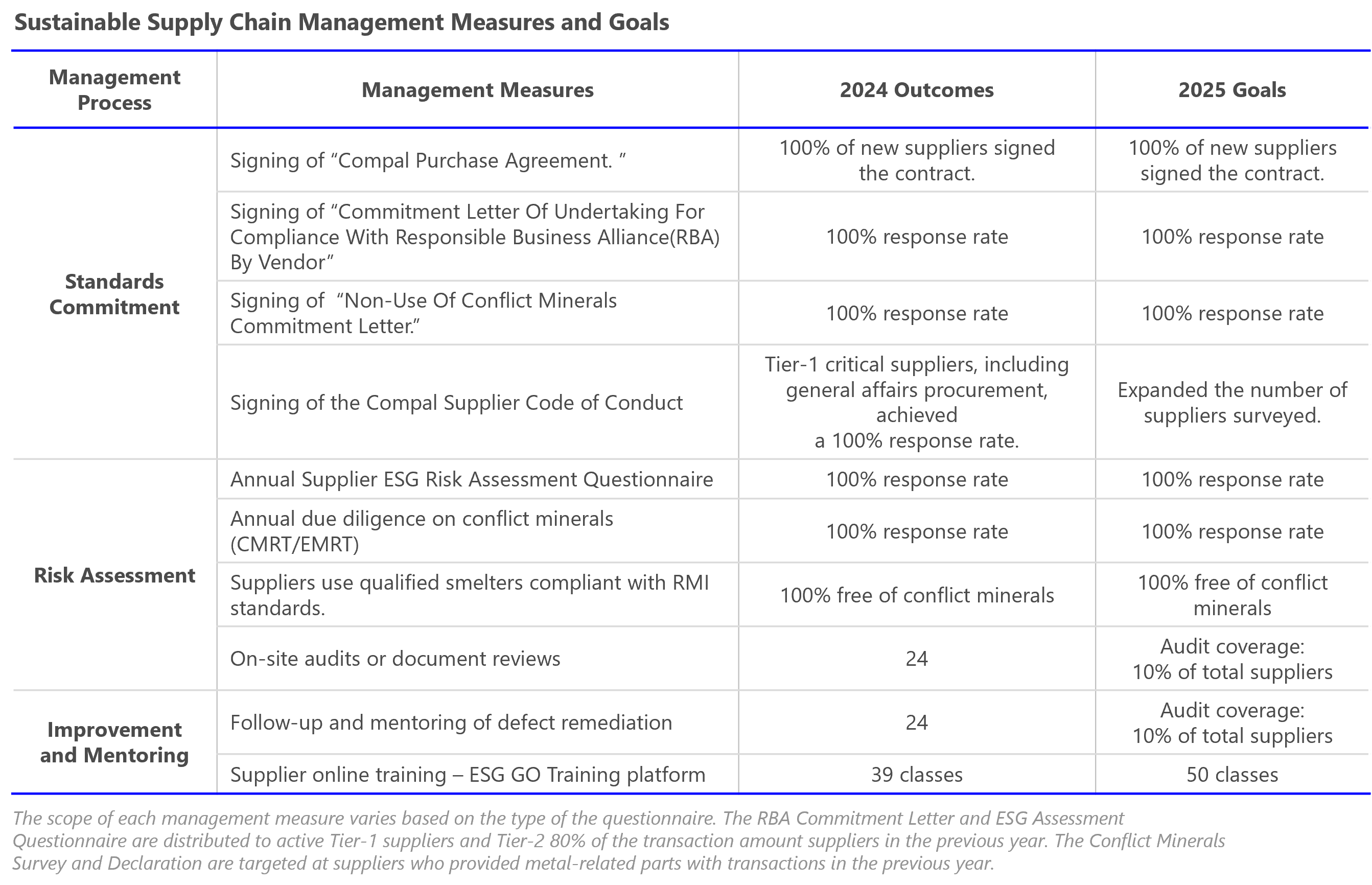
■ New Supplier Evaluation
The sustainability performance and record of suppliers can indirectly affect Compal’s reputation or interests. To reduce potential risk, we engage in proactive screening for risk reduction when potential new suppliers are being assessed. Assessment factors include environmental, social, and governance (ESG) performance, operational status, country of origin, industry background, and product relevance. To further strengthen our supplier screening process, if there is a major international event, the regions, industries, and sources of supply involved are also investigated and analyzed to ensure the stability and continuity of the supply chain, while safeguarding the Company's reputation and interests. This ultimately enhances overall supply chain efficiency and resilience.
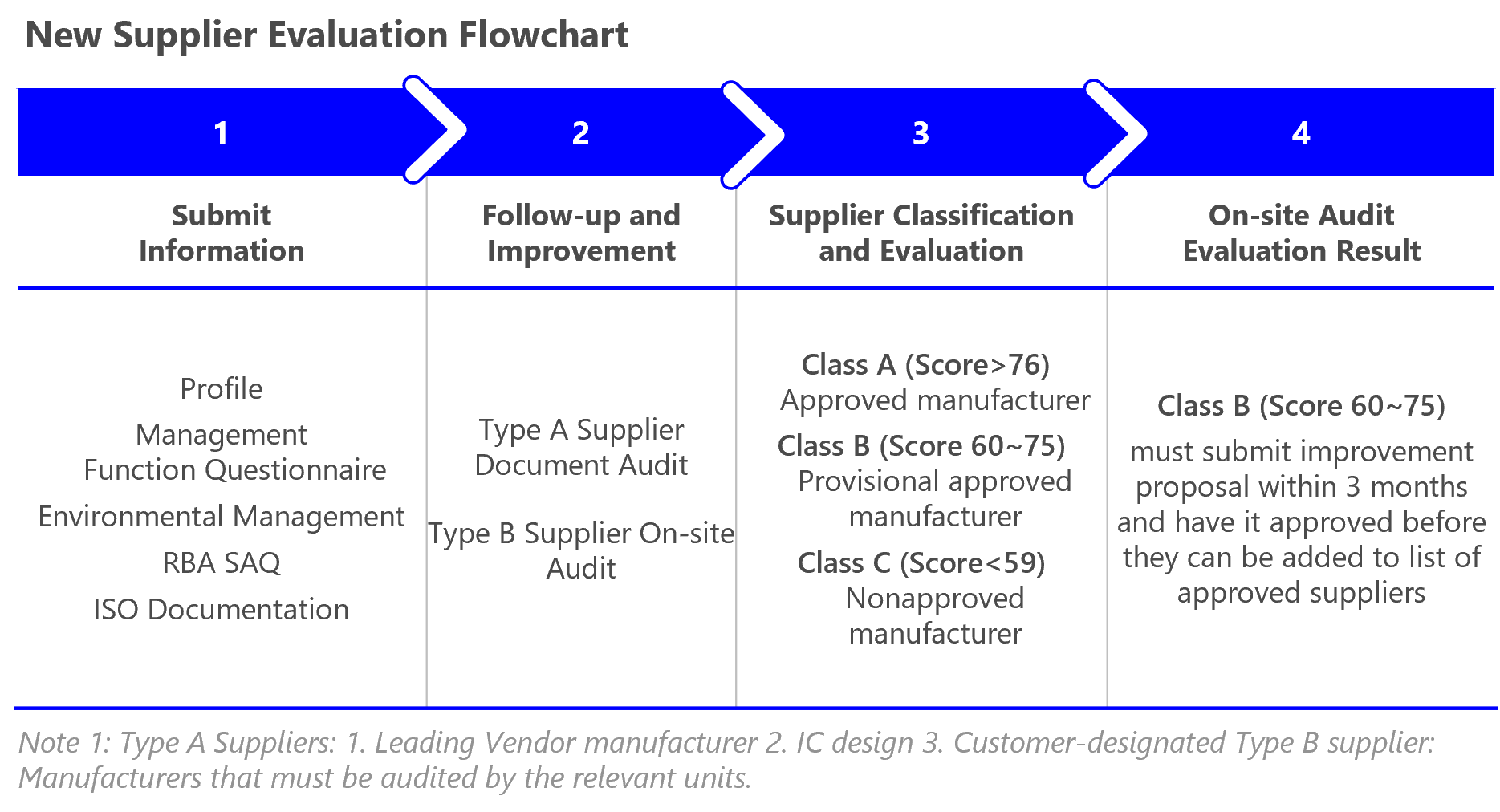
Compal has established specific ESG thresholds for supplier onboarding and incorporates suppliers’ ESG performance into the evaluation process, with ESG-related criteria accounting for 19% of the total weight. Environmental factors include environmental management and policies, and waste management; social factors include occupational safety and health; governance factors encompass business strategy, information security protection, and supplier selection. Procurement, R&D, and Supplier Quality Engineering (SQE) units form an investigation team to conduct on-site, document, or other forms of audits of suppliers. Suppliers rated Grade A (score over 75) are immediately included in our list of qualified suppliers after evaluation. Grade B suppliers (score between 60~75) are monitored by relevant departments for improvement. If a supplier is still unable to achieve grade “A” after improvements are made, they are added to the list of annual assessments for improvement tracking. Suppliers receiving a “C”grade will also be directly disqualified. Grade C suppliers are not approved. Contract signing can proceed only after all units complete the scoring process. New suppliers successfully screened during 2023–2024 are listed below.
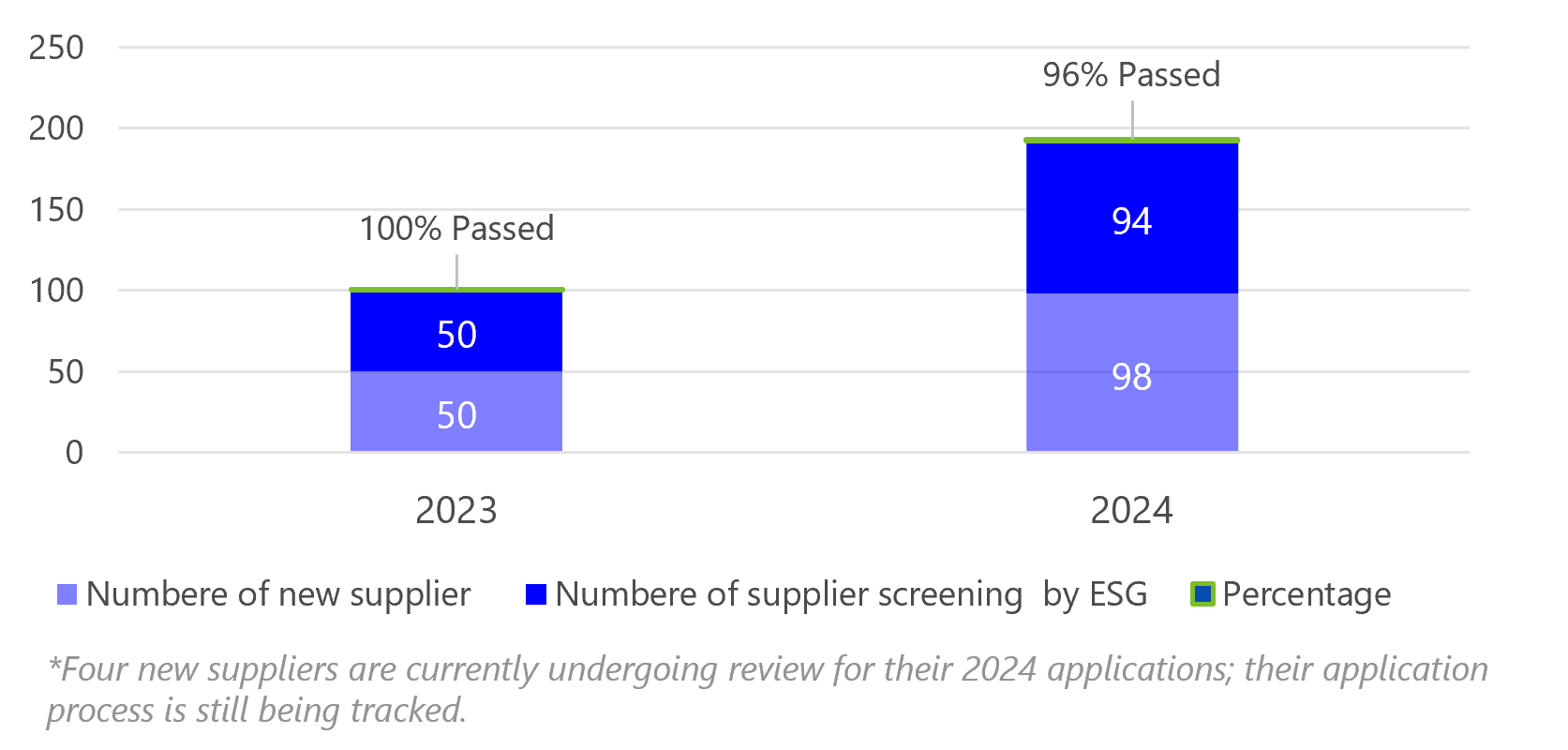
■Suppliers Code Conduct
Compal has established and publicly issued a Supplier Code of Conduct as a basis for supplier compliance to ensure that suppliers strictly adhere to international sustainability regulations and standards. The code aligns with the RBA Code of Conduct, covering aspects of labor rights, health and safety, environmental protection, business ethics, and management systems. To ensure the code meets the latest international standards, we regularly review and optimize it based on evolving international sustainability issues.
In 2024, Compal updated its code in accordance with the latest RBA 8.0 Code of Conduct by integrating 14 internal sustainability policies, to specifically emphasize the importance and management of biodiversity and natural ecological protection for environmental sustainability. In 2024, we achieved a 100% signing rate for Tier-1 critical suppliers (including general affairs procurement). The complete code is publicly available on our ESG official website: Compal_SCC_2024_v0_tc. In the future, we will continue to encourage our supply chain partners to align with international standards, to ensure that as the supply chain develops, it also takes care of environmental sustainability and ecological balance.
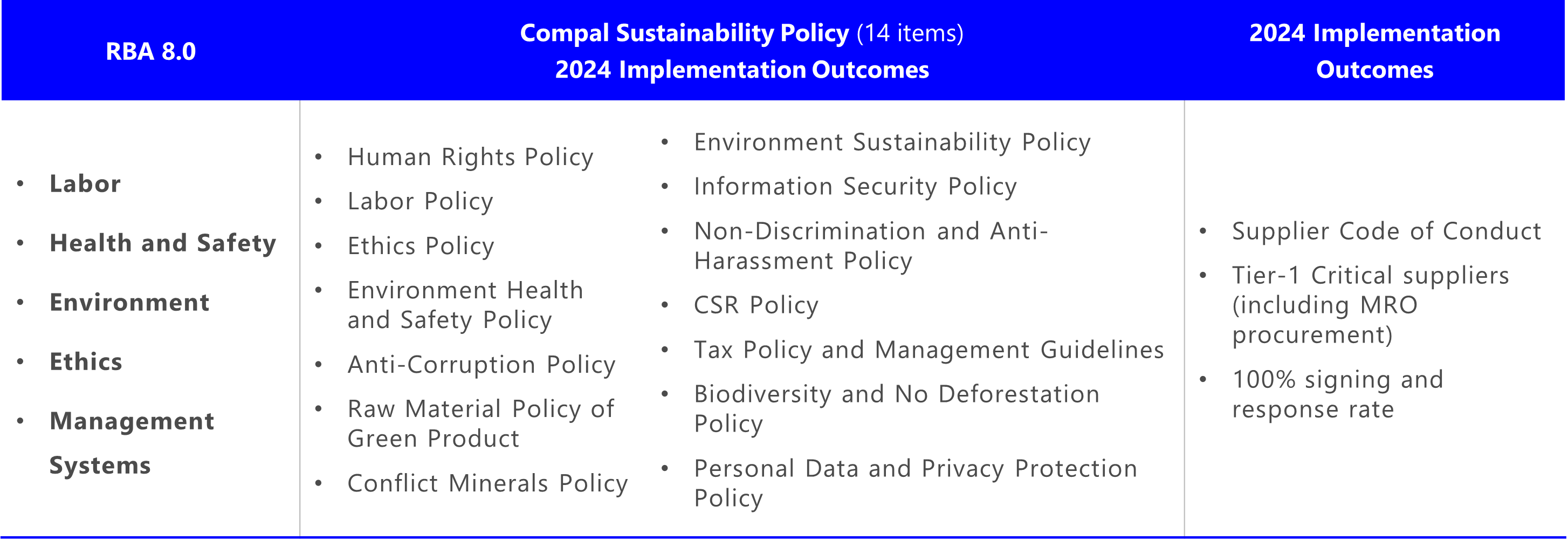
Compal's Supply Chain Code of Conduct 
Sustainable Risk Management
■ Risk Level Identification and Inventory
The SAQ self-assessment questionnaire was designed by Compal using the RBA Code of Conduct as its reference to investigate supplier performance in the aspects of labor, health and safety, environment, code of ethics, and management system. In 2024, it also include issues to greenhouse gas inventory and international initiatives, accepting RBA SAQ, VAP, Non-VAP, or equivalent audit reports specified by CMA customers. Considering business relevance, a total of 780 suppliers were assessed, covering all of Compal's Tier-1 suppliers and 80% of the procurement value from non–Tier-1 critical suppliers. This also includes 116 of Compal’s significant suppliers, with a 100% questionnaire response rate. Suppliers failing to cooperate with the investigation will be reported to relevant units, with recommendations to revoke their approved status.
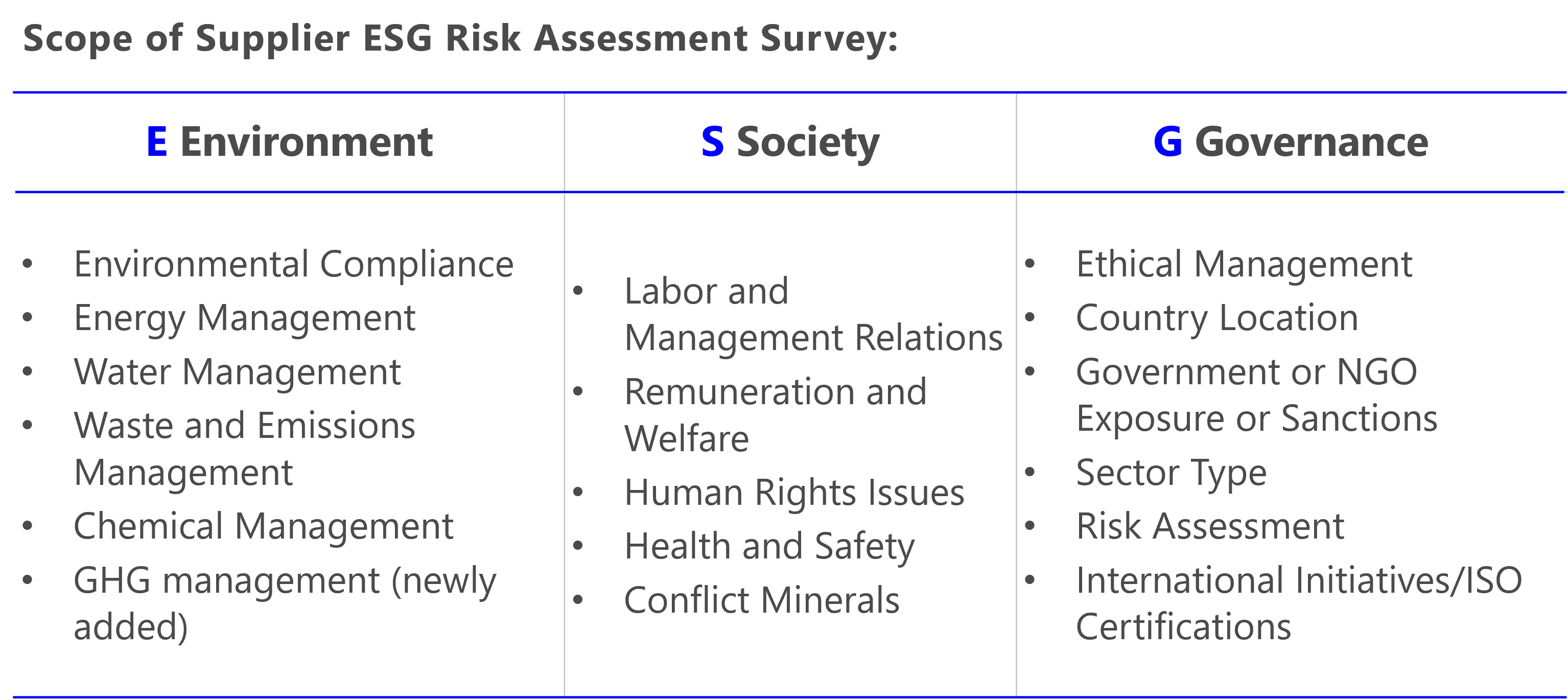
The ESG Risk Assessment Questionnaire categorizes suppliers into high, medium, and low risk based on the importance of issues, while considering inherent risks Note 3 for inclusion in the audit sampling list. In 2024, following risk analysis, 5% of suppliers proceeded to the next stage for management and underwent internal or third-party document and on-site audits and coaching to ensure compliance with Compal’s ESG standards and reduce supply chain risks. For supply risk management, we regularly review the resilience of suppliers’ global production sites to ensure appropriate measures are taken to maintain supply chain resilience during international geopolitical risks.
Note 3: Inherent risks: Employee density, use of hazardous chemicals or radioactive materials, and generation of toxic or regulated waste, industrial wastewater, or industrial exhaust gas
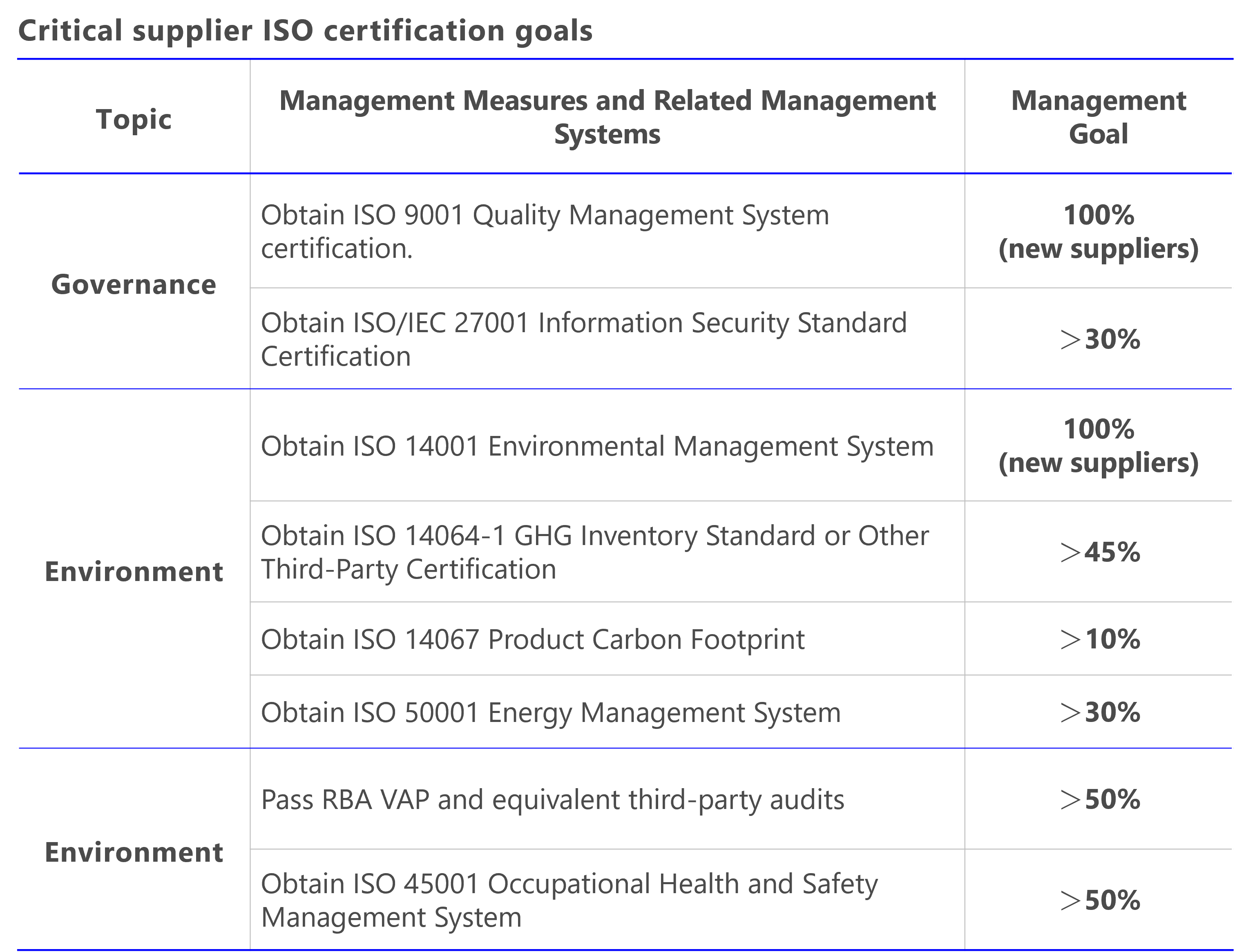
■ Greenhouse Gas Management Capability Identification
To achieve Compal's Scope 3 greenhouse gas reduction targets, we analyze high-carbon-emission industries, suppliers’ greenhouse gas management capabilities, and the criticality of their transactions. This helps us identify suppliers with carbon reduction potential and then plan and negotiate future collaborations on greenhouse gas management and carbon reduction projects. Key evaluation criteria include:
- Greenhouse gas inventory: Whether a greenhouse gas inventory has been conducted, its scope, and if it has been verified by a third party.
- International initiatives: Participation in international carbon reduction initiatives, such as the CDP, SBTi, or RE100.
- ISO international certifications: Whether relevant ISO international certifications have been obtained, such as ISO 14064-1 GHG inventory, ISO 50001 energy management system, ISO 14067 product carbon footprint inventory.
- Criticality of transaction with Compal: Suppliers with direct transactions representing the top 80% of Compal's annual procurement value.
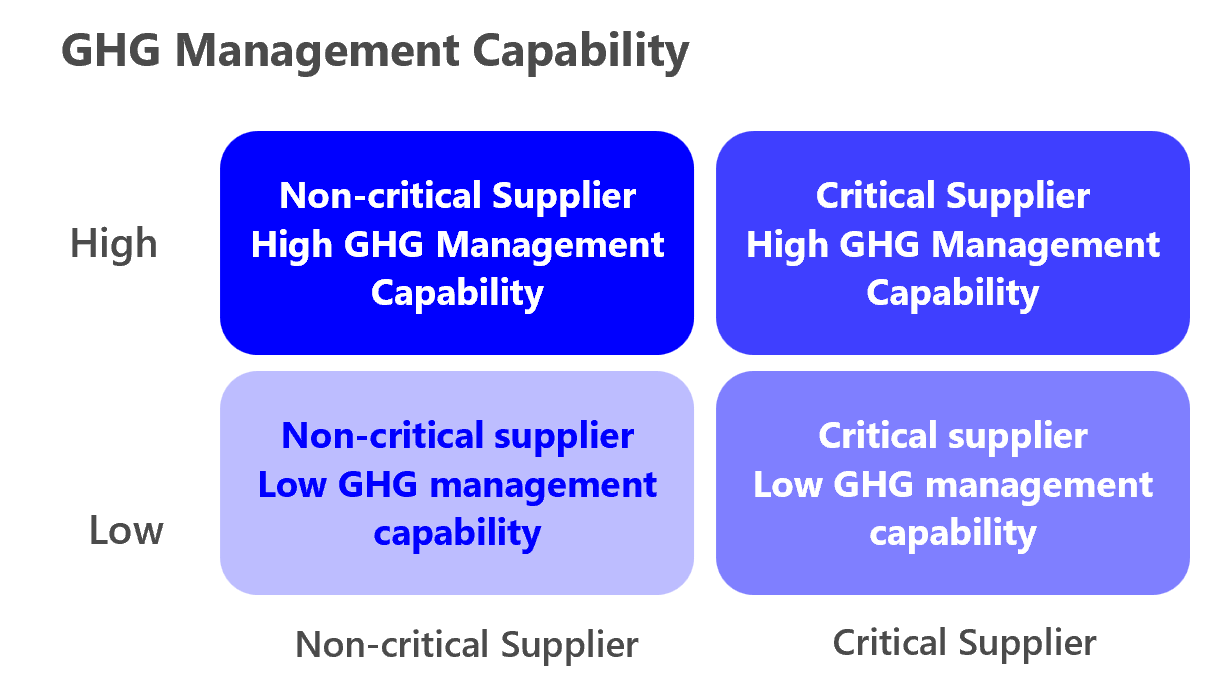
Responsible Supply Chain Independent Accountant's Limited Assurance Report 